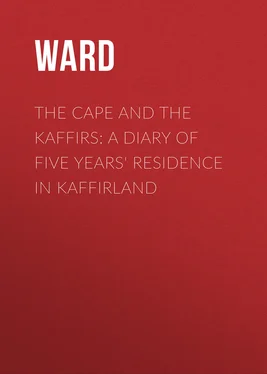Ward - The Cape and the Kaffirs - A Diary of Five Years' Residence in Kaffirland
Здесь есть возможность читать онлайн «Ward - The Cape and the Kaffirs - A Diary of Five Years' Residence in Kaffirland» — ознакомительный отрывок электронной книги совершенно бесплатно, а после прочтения отрывка купить полную версию. В некоторых случаях можно слушать аудио, скачать через торрент в формате fb2 и присутствует краткое содержание. Издательство: Иностранный паблик, Жанр: foreign_prose, История, foreign_edu, foreign_antique, на английском языке. Описание произведения, (предисловие) а так же отзывы посетителей доступны на портале библиотеки ЛибКат.
- Название:The Cape and the Kaffirs: A Diary of Five Years' Residence in Kaffirland
- Автор:
- Издательство:Иностранный паблик
- Жанр:
- Год:неизвестен
- ISBN:нет данных
- Рейтинг книги:4 / 5. Голосов: 1
-
Избранное:Добавить в избранное
- Отзывы:
-
Ваша оценка:
- 80
- 1
- 2
- 3
- 4
- 5
The Cape and the Kaffirs: A Diary of Five Years' Residence in Kaffirland: краткое содержание, описание и аннотация
Предлагаем к чтению аннотацию, описание, краткое содержание или предисловие (зависит от того, что написал сам автор книги «The Cape and the Kaffirs: A Diary of Five Years' Residence in Kaffirland»). Если вы не нашли необходимую информацию о книге — напишите в комментариях, мы постараемся отыскать её.
The Cape and the Kaffirs: A Diary of Five Years' Residence in Kaffirland — читать онлайн ознакомительный отрывок
Ниже представлен текст книги, разбитый по страницам. Система сохранения места последней прочитанной страницы, позволяет с удобством читать онлайн бесплатно книгу «The Cape and the Kaffirs: A Diary of Five Years' Residence in Kaffirland», без необходимости каждый раз заново искать на чём Вы остановились. Поставьте закладку, и сможете в любой момент перейти на страницу, на которой закончили чтение.
Интервал:
Закладка:
We were up with the dawn next morning, and crossed the beautiful ford of the Sunday River, at sunrise. “Who would imagine,” thought I, “that such a scene of peace and beauty should be one of the fastnesses for wild beasts?” Green boughs met each other across the stream. Down such a pleasant-looking river I had often glided in “merry England,” singing, by the way, with young companions, to the gay music of our guitars, while the plash of oars kept time to the measure of our happy voices. There, in our own happy land, no lions prowled in our neighbourhood, no panthers could we fancy glaring on us from the bush, no venomous reptiles awaited our feet as we stepped upon the green sod from the boat. A South African climate is beautiful all the year round, except when visited by terrific thunderstorms, with their usual accompaniments of hail, rain, and lightning. Ah! that word “except;”—“except” for our dark November days and painful frosts, England would be an unexceptionable residence; still, even with these outward discomforts, look at our fire-sides!
But why go dreaming back from the brimming, shady Sunday River to the “stately homes of England!” On, on! and let us be thankful, that so far from home there is yet so much to be thankful for, and to enjoy. Oh! for the blessed philosophy which teaches us to make light of every thing! Truly, content is riches! In a moral point of view, may it not be considered as bearing an analogy to the story of the philosopher’s stone, (always remembering the one to be theory, the other practicable), which was supposed to possess the gift of transmuting whatever the possessor of it touched into gold?
Конец ознакомительного фрагмента.
Текст предоставлен ООО «ЛитРес».
Прочитайте эту книгу целиком, купив полную легальную версию на ЛитРес.
Безопасно оплатить книгу можно банковской картой Visa, MasterCard, Maestro, со счета мобильного телефона, с платежного терминала, в салоне МТС или Связной, через PayPal, WebMoney, Яндекс.Деньги, QIWI Кошелек, бонусными картами или другим удобным Вам способом.
1
In the Blue Book for 1847, the latest published account, the numbers stand, 71,113 white, and 75,977 coloured; but this leaves more than 21,000 of the total unaccounted for.
2
“Persons will be at liberty to make payments for colonial lands in this country, for which payment or deposit they will receive an order for credit to the same amount in any purchase of land they may effect in the colony, and will have the privilege of naming a proportionate number of emigrants for a free passage, as explained in the next article. The deposits must be made in one or more sums of 100 pounds each at the Bank of England, to the account of the Colonial Land and Emigration Commissioners; and the depositor must state at the time the colony in which the land is to be selected, and give notice to the Commissioners of the deposit. Upon production of the Bank’s receipt for the money, the Commissioners will furnish the depositor with a certificate, stating the amount which he has paid, and entitling him to obtain credit for that sum in any purchase which he may effect in the colony, subject to all rules and regulations in force in the colony at the time such purchase may be made.
“For every sum of 100 pounds deposited as above, the depositor will be entitled, for six months from the date of payment, to name a number of properly qualified emigrants, equal to five adults, for a free passage. Two children between one and fourteen are to be reckoned as one adult. The emigrants are required to be chosen from the class of mechanics and handicraftsmen, agricultural labourers, or domestic servants, and must be going out with the intention to work for wages. They are to be subject to the approval of the Commissioners, and must, in all respects, fall within their general regulations on the selection of labourers. The purchaser and his family cannot receive a free passage under this privilege.”
3
The Boers, however, had little liking for this arrangement, which severed them from their parent country, and their hearts yearned towards a reunion with it. Of this I had a positive assurance before it was my fate to visit the colony myself. In the year 1838 I had the honour of making the acquaintance of H.R.H. Prince William Henry of Orange, who was on his voyage home in the “Bellona” frigate from Java, viâ Saint Helena. He dwelt with great pleasure on the circumstance of several Dutch families having travelled many miles from the interior to meet him at Cape Town, when he touched there. Aged men and women, who had scarcely moved out of their farm sitting-room for years, hastened to meet a Prince from their beloved Fatherland.
4
Shortly after Lord Charles Somerset succeeded to the government of the Cape, in 1817, Graham’s Town being attacked by Makanna, the pretended Kaffir prophet, a witch-doctor, Colonel, now Major-General Sir Thomas Wiltshire, after defeating a horde of these savages, followed up his success by pursuing them into their own country, where he forced them to sue for peace. This was granted, on condition of their surrendering Makanna, and giving up in atonement for their past, and as security against future offences, that tract of country lying between the Fish and Kat Rivers on the one side, and the Tyumie and Keiskama on the other.
5
Even in their hunting expeditions, the Kaffirs exhibit a peculiarity which goes far to prove that the sight of blood renders them unnaturally ferocious. At the death of a jackal, a buck, or any large game which, they have run down, each hunter presses on to give a last stab at the victim, even after death. I observed this also among the Fingoes, in their war-dance, as afterwards described. Captain Harris alludes to it in his “Sporting Expedition in Africa,” when he so graphically describes the death of a young eland. “The savages came up,” he says, “and in spite of my remonstrances, proceeded with cold-blooded ferocity to stab the unfortunate animal, stirring up the blood, and shouting with barbarous exultation as it issued from each newly-inflicted wound.”
6
The term “Kaffir,” is by no means recognised by the Kaffirs themselves. It was bestowed on them by the Portuguese. The word is from the Arabic, and signifies “Infidel.”
7
The word “kraal” applies either to the group of huts forming a village, to a single hut, or the fold for the cattle.
8
A small bird, which, attracting the notice of travellers by its cry, guides them to the wild bees’ nests in trees, or clefts of rocks.
9
An inhabitant of Madeira gave an excellent reason for this apparent fault, viz, that the houses being built closely together afforded a shade from the sun that wide streets would not have have done.
10
This fine jetty was destroyed in a gale of wind, in 1847, by a ship, which, having broken from her moorings, was driven, stern foremost, right through the fabric. The unfortunate crew, jumping from the ship to the lower end of the jetty, had congratulated themselves on their escape from the raging waves, when another vessel coming in contact with the wood-work, carried the whole of it away with its unhappy and ill-starred freight into the boiling surge beneath!
Читать дальшеИнтервал:
Закладка:
Похожие книги на «The Cape and the Kaffirs: A Diary of Five Years' Residence in Kaffirland»
Представляем Вашему вниманию похожие книги на «The Cape and the Kaffirs: A Diary of Five Years' Residence in Kaffirland» списком для выбора. Мы отобрали схожую по названию и смыслу литературу в надежде предоставить читателям больше вариантов отыскать новые, интересные, ещё непрочитанные произведения.
Обсуждение, отзывы о книге «The Cape and the Kaffirs: A Diary of Five Years' Residence in Kaffirland» и просто собственные мнения читателей. Оставьте ваши комментарии, напишите, что Вы думаете о произведении, его смысле или главных героях. Укажите что конкретно понравилось, а что нет, и почему Вы так считаете.












